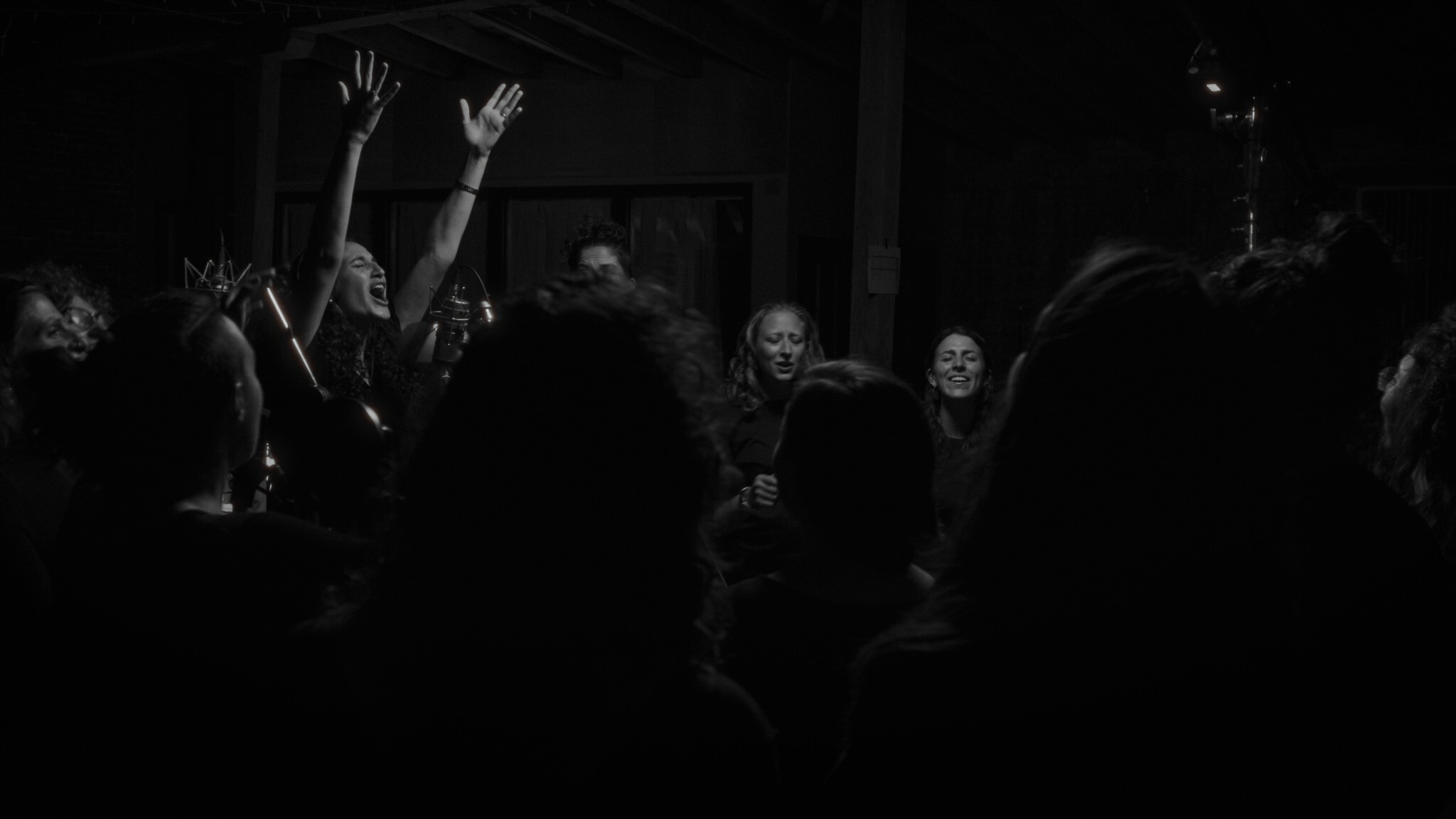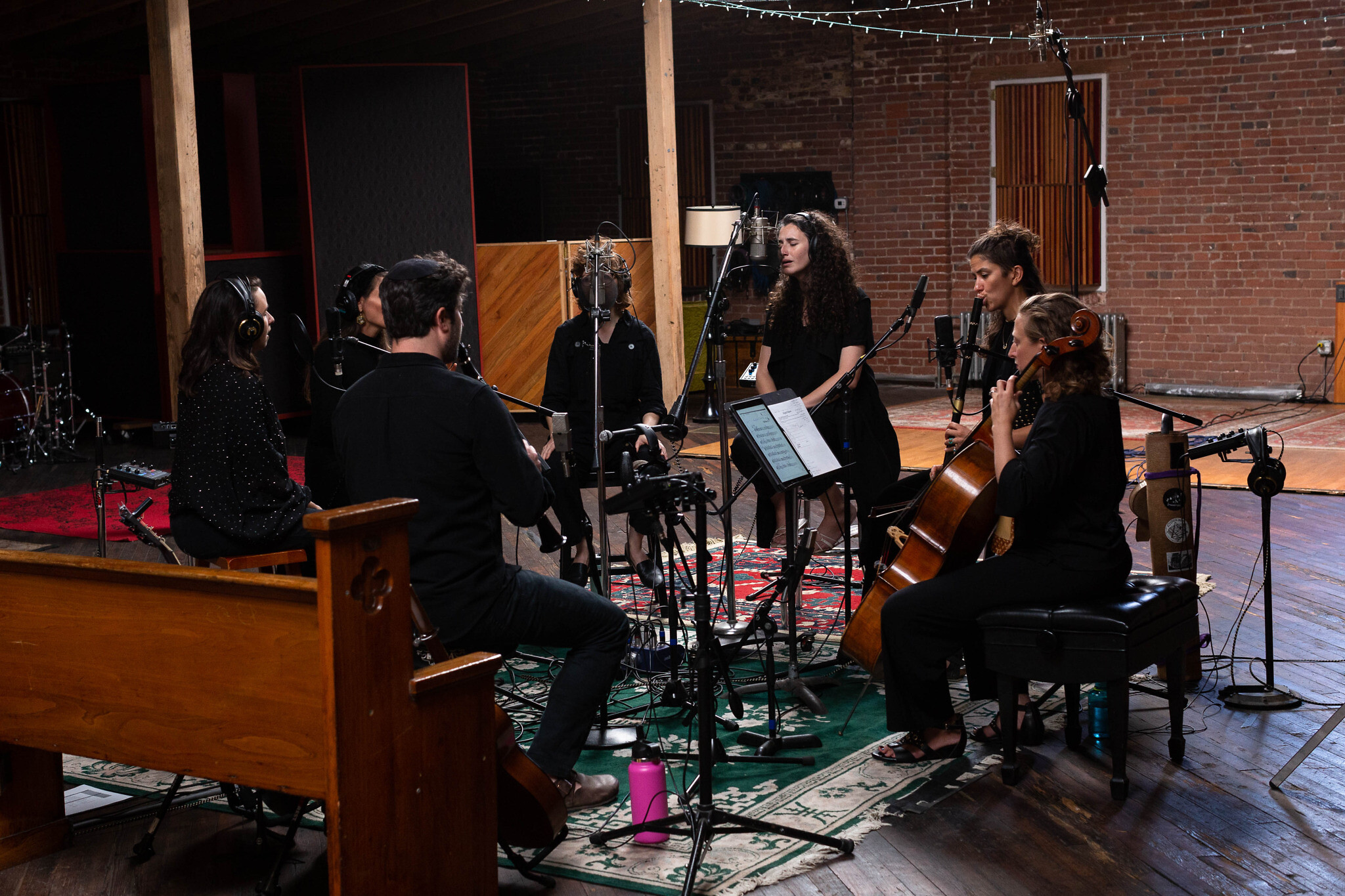There’s a powerful sense of the spiritual and sacred in the songs of “Kapelya,” a new full-length album of Hasidic melodies. There’s also a bit more than a tinge of subversiveness lurking in the LP, the first such album to be sung exclusively by women.
For hundreds of years, the liturgical tunes, known as took a bitewere only sung publicly by men. “Kapelya,” Yiddish for musical ensemble, turns that on its head with 22 female vocalists, led by Chana Raskin and her Raza musical prayer circle.
The concept album takes listeners on a meditative, introspective journey through 13 tracks of sacred nigunim from the Hasidic Chabad tradition, blending prayer, klezmer, traditional medicine music and Jewish pop from the 1970s through 1990s.
Much of the music is carried by choral chants of the melodies, full of pathos, soul and deep meaning for its singers and listeners.
Raskin, a daughter and granddaughter of Lubavitch Hasidim, comes to the music honestly. Her grandfather and great uncle were well-known figures in the community.
“They were these icons, working Hasidim and what it meant to be a Hasid and be totally devoted,” said Raskin, describing her grandfather’s fish store and great uncle’s fruit shop in Crown Heights, Brooklyn, where she was born and raised.
Raskin’s father is a scholar who teaches Hasidutthe philosophy of the Hasidic movement, and writes footnotes for the movement’s texts.
It was her father, a lover of nigunim and singing, who introduced Chana, the second oldest in their family of eight children, to the meditative music.
There were cassette albums played in their home and mirthful Hasidic gatherings, known as color raceson Shabbat afternoons and holidays, usually at 770 Eastern Parkway, headquarters of the Lubavitch movement and the home of spiritual leader Rabbi Menachem Mendel Schneerson until his death in 1994. There, hundreds of Lubavitch men would congregate to sing and listen to the rebbe’s teachings.
Raskin and other small children who were brought along would tuck themselves under their fathers’ feet, she said, describing a cozy crawl space between the benches of the bleachers.
“It was an underworld that literally no one knows about,” she said. “I experienced nigunim in that context and it really shaped me.”
In her 20s, Raskin began growing away from Chabad and made her way to Israel to study Judaism at Beit Yisrael, a Jerusalem-based pre-army preparatory program for both religious and secular participants.
At one gathering there, Raskin was given a microphone and asked to sing the nigunim of her childhood. Coming from a religious community in which women never sing publicly, it marked the first time Raskin could share the spiritual tunes of her upbringing.
Chana Raskin, founder of Raza, a musical prayer circle that released its first album, ‘Kapelya,’ of Hasidic nigun (Courtesy Chana Raskin)
“It was extraordinary,” she said. “It wasn’t about me being a woman, singing in public, they simply wanted me to share, it was seen as holy.”
Raskin eventually immigrated to Israel, working in informal education, writing, editing, and figuring out life in her home.
Music, however, was not part of the game plan.
In 2014, Raskin fell and suffered a minor traumatic brain injury that sent her into serious rehabilitation in which she had to relearn language and movement.
She spent much of that time back in her parents’ house, doing whatever she could to reconfigure her life, which included joining a kollela Jewish learning program for adults, to relearn Hebrew. There was no aspect of her life that hadn’t changed.
It was during that period of recovery that Raskin moved temporarily to the more serene countryside of upstate New York, where she could focus more easily. She often found herself humming music and the songs of her childhood in order to relieve her pain.
“I couldn’t read, so I just rose up and would sing in the woods where there’s so much more space and quiet,” said Raskin.
She sang nigunim, but they sounded different than the farbrengen of her childhood, and it was clear that the music now made sense in a different way.
Back in Israel, as Raskin recovered, she began organizing monthly gatherings for others interested in the music, with a smaller, dedicated circle meeting weekly. Some people were from more progressive communities and others from Hasidic backgrounds.

Chana Raskin and her Raza circle that recorded the Kapalya album of sacred Lubavitch tunes, sung by women, released February 22, 2023 (Courtesy Raza)
Out of those initial singing groups emerged Raza, a musical listening project exploring feminine sounds in Hasidic melodies. Raza means secret or hidden in Aramaic, and the Raza Circle is a musical prayer space for participants to dive into the world of nigunim.
Raskin first consulted with her father before she graduated to other musical sources within the Lubavitch community.
“I was terrified,” said Raskin, who was very aware of her lack of professional musical training as well as her movement into a space that was traditionally reserved for Hasidic men. “I’m not qualified, but what does that even look like?”
What moved her most was the variety of women who would come to the singing circles. There were women from non-religious backgrounds, but also women who were newly religious or from Hasidic lifestyles.
“They would come and sing with us and I would wonder, ‘who are you and how are you finding me?’” said Raskin.
The experience was wild, said Raskin. She recorded the sessions with the participants’ permission and posted them online, which would lead to dozens more people reaching out to her.
She was encouraged to formally record the nigunim by Joey Weisenberg, a musician and friend from the Hadar Institute, where Raskin was studying.
When she was finally ready to produce an album, after getting married and having a baby, he was the first one she called.
Raskin credits Weisenberg with helping her “breath it into being,” for being the kind of mentor who allowed her to trust herself and her musical acuity. He’s also the only man (seen in the photo below), at the women-only circle.
“I get it now,” she said. “I get that I’m a musician, that that is my identity.”

Chana Raskin and her Raza circle that recorded the Kapalya album of sacred Lubavitch tunes, sung by women, released February 22, 2023 (Courtesy Chana Raskin)
Still, it’s been an unexpected journey from the farbrengen of her Crown Heights childhood to circles of sacred female singers.
“This album knocked on my soul’s door,” she said. “It isn’t about me, or my skill set, it had to happen and I was the person tagged for it.”
The album was released February 22 and Raskin, who now lives in Israel’s upper Galilee with her husband and children, is planning summer shows in Israel and the US, a kind of alternative farbrengen.
She also wants to continue to work with people with mental health issues through the music, knowing how much it helped her in her own recovery process.
The album has shown Raskin the impact she can have by simply holding real, interactive concerts in different communities.
“That’s a farbrengen,” she said. “A spiritual gathering where people are willing to show up and become part of it.”